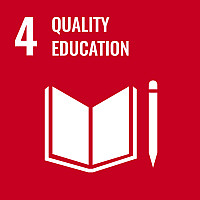My Experience with the VOCES Project
October 30, 2025
Marihana Heloany Reis

SDG: 4 Quality Education
Purchase College introduced a new program in Fall 2023 called VOCES (Voices in Spanish), which focuses on the Latinx student community on campus. This initiative creates a space for students to reconnect with the Spanish and Portuguese languages while also documenting the experiences of Latinx individuals. One of its key components is recording oral histories from Latinx community members, preserving their voices, and making their stories public through a digital archive. Oral history, unlike traditional history, is much more personal—it gives individuals the opportunity to share their lived experiences, perspectives, and emotions, which allows us to understand history in a more personal and real way. By doing this, the program creates a sense of belonging and highlights the contributions of Latinx individuals both within and beyond Purchase College.
Before becoming a teaching assistant this semester, I was a student in the VOCES program, and it was through my own participation that I first understood how meaningful and impactful it could be. As someone who values collecting, sharing, and giving a voice to people like me, this program resonated deeply with my own experiences. It was an opportunity for me to connect with others who shared similar backgrounds and understand the importance of preserving our histories for future generations.
The VOCES program offers students the opportunity to develop academic and professional skills. Participants learn how to conduct research, interview subjects, collect and document oral histories, and create transcriptions. These skills extend beyond the classroom, preparing students for future academic projects, including senior theses, as well as professional careers in various fields. More importantly, these recordings serve as a way to give voice to Latinx community members and ensure their histories are preserved for future generations. Programs like this help prevent the erasure of these important cultural narratives and create a deeper connection to history.
For Latinos born in the U.S., maintaining a connection to their heritage can be crucial because it connects them to their family abroad and to their culture, but it can be challenging. Many second- and third-generation Latinx individuals experience language loss, making it harder for them to communicate with family members and stay connected to their roots. VOCES addresses this issue by offering a Spanish course for heritage speakers, allowing students to refine their language skills and feel more confident using Spanish in daily life.
Programs like VOCES are particularly important because Latinx students continue to face systemic barriers in higher education. Despite being one of the fastest-growing demographic groups in the U.S., Latinx students have some of the lowest college completion rates. Financial difficulties, lack of academic support, and cultural disconnection are just a few factors that contribute to these challenges. At Purchase College, over twenty-five percent of students, including myself, identify as Latinx. Given this significant presence, it is crucial to have programs that specifically support us, not only to help us navigate higher education, but also to ensure that our experiences are acknowledged and valued. Culturally responsive programs like VOCES help maintain students’ sense of identity, provide academic resources, and create a supportive community that can make a real difference in retention and graduation rates.
During its first year, VOCES has focused on the nearby community of Port Chester, a town where nearly sixty percent of residents are Latino, according to the 2024 Census. While the program benefits current Purchase students, it also has the potential to impact on the broader community by increasing awareness of the college and its accessibility. Many young Latinx individuals in Port Chester may not see higher education as an achievable goal, either due to financial concerns, lack of information, or the belief that college is not meant for them. By engaging with local Latinx communities, VOCES helps bridge this gap, showing prospective students that college is within reach.
For me, the question of access to higher education is deeply personal. When I first thought about going to college, it seemed like a distant and almost impossible goal. It took me more than five years to finally get here, and I know that my experience is not unique. If a program like VOCES had existed earlier, I might have found my path to college sooner. Having a space where Latinx students can see themselves reflected, share their experiences, and receive academic and cultural support can make all the difference in a student’s educational journey.
It is also important to mention that VOCES is only possible because of a grant from the National Endowment for the Humanities. In this political moment where we are seeing many cuts on fundings for higher education being made and attacks on inclusion programs, it is more important than ever to highlight and support programs like VOCES.
VOCES is still a new program, but I am confident that it will continue to grow and make an even greater impact. As more students participate, the collection of recorded stories will expand, and the sense of community will strengthen. I hope that this program not only benefits Purchase students, but also reaches Latinx individuals beyond our campus, creating a legacy of cultural preservation and academic empowerment.
Marihana Heloany Reis
2023 Cohort
“SUNY at Purchase College.” Data USA, 2023.
https://datausa.io/profile/university/suny-at-purchase-college.
U.S. Census Bureau QuickFacts.
https://www.census.gov/quickfacts/fact/table/portchestervillagenewyork/PST045224.
“VOCES–Oral Histories and Spanish for Heritage Speakers.” Purchase College, SUNY.
https://www.purchase.edu/academics/school-of-humanities/voces/.
